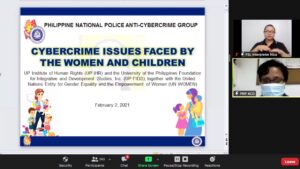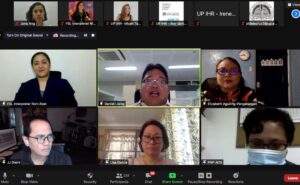UP IHR webinar highlights prevalence of online gender-based violence in the Philippines
The UP Institute of Human Rights (UP IHR) and the UP Foundation for Integrative and Development Studies (FIDS), together with the United Nations Entity for Gender Equality and Empowerment of Women (UN Women), organized on 2 February 2021 a webinar discussing the Cybercrime Prevention Act. The webinar is a part of the UN Women Access to Justice Program, which aims to raise awareness and understanding to prevent cybercrime and online gender-based violence.
The program is led by Ms. Jona Marie Ang, the National Program Officer of UN Women, handling the Access to Justice Program, and Prof. Elizabeth Aguiling-Pangalangan, FIDS Project Leader and the Director of the UP IHR. The UN Women Access to Justice program endeavours to bridge the gap between formal and informal remedies through the empowerment of women, the reduction of gender biases, and the development of the capacities of grassroots women’s organizations in their pursuit of justice. As part of the program, UN Women partnered with UP FIDS and UP IHR to organize a series of webinars to address the issues impacting women and girls and aims to make justice accessible to them.
“We focus on young women because women as a group are disproportionately subjected to various forms of discrimination…. There has been a lot of online abuse in various parts of the world, and many of these women experience fear and have received intimidating messages, threats of violence, and have been victims of sexting, doxing, and image-based sexual assault” Prof. Aguiling-Pangalangan explained.
This webinar was attended by around 250 participants from all over the Philippines and was formally moderated by Atty. Daniel Lising, MD, Law Reform Specialist of the UP IHR. Three speakers shared their insights, and an open forum was held right after. The first speaker was Professor Jose Jesus Disini Jr., an Associate Professor and the Program Director of the Technology Law and Policy program at the UP College of Law, who discussed how cybercrime law interfaces with crimes against women. He elaborated on that all crimes defined in all criminal laws are cybercrimes, pointing to Secs. 6 and 7 of RA 10175, which state that if the crime is committed by, through, and with the use of information and communications technologies, it is considered as cybercrime and is punishable one degree higher. Prosecution under the RA10175 will not be a prejudice to any liability for violation under the Revised Penal Code or special laws.
Prof. Disini also discussed the Rule on Cybercrime Warrants, which grants remedies that the law enforcement can use to investigate cybercrimes. One of the remedies that may be availed is the Preservation of Computer Data, which is an order that the law enforcement agency can issue to the telecommunications company for the preservation of certain computer data for a period of six months and may be extended. The warrants also available are the Warrant to Disclose Computer Data, the Warrant to Intercept Computer Data, the Warrant to Search, Seize and Examine Computer Data, and the Warrant to Examine Computer Data. If the warrant issued was not complied with, then the law enforcement officer can charge the person to whom the warrant was directed with obstruction of justice. Additionally, the person may be held liable for contempt by the court.
Prof. Disini wrapped up his discussion by explaining cybercrime court proceedings. He explained that the location of the evidence is important. Screenshots, while admissible, must be testified to by the person who took the screenshot; thus, it is preferable that the complaint be the one to take the screenshot. If the data is located with the local telecommunications company, then a person representing the company must testify. Lastly, Prof. Disini stressed that if the victim wishes to file a cybercrime case against a perpetrator, then the evidence presented must be properly identified, attributed, and authenticated to secure a conviction; and that’s easier said than done.
The second speaker, Ms. Liza Garcia, Executive Director at the Foundation for Media Alternatives, discussed cybercrime and online gender-based violence in the Philippines, the impacts it has on women, and the legal and metalegal ways of addressing these issues.
“[When discussing] online gender-based violence….we also consider it as a pandemic because, like a virus, it seeps through many different places and it affects and impacts women.” Garcia remarked.
In 2020, the Foundation for Media Alternatives, through their annual mapping of reports, saw a 165% increase in the number of cases involving online gender-based violence. Garcia highlights that the age of the victim-survivors of gender-based violence is, on average, very young, with around 60% of the victim-survivors below the age of 30 years old. Garcia also notes that the State must ensure that there are adequate laws addressing the discussion and the underlying causes of the issues.
The last speaker, Police Major Lalaine SR Marty, the Assistant Chief of the Women and Children Cybercrime Protection Unit under the PNP-Anti-Cybercrime Group. PMAJ Marty discussed the cybercrime and the cybercrime issues faced by women and children. The types of gender-based interpersonal crime include internet trolls, cyberstalking, cyber harassment, cyberbullying, sextortion, child pornography, online child grooming, and sexting.
“There is an increase of cybercrime offenses and cyber-related offenses, with a total crime volume of 21,561” stated PMAJ Marty, discussing the cybercrime statistics monitored by the PNP Anti-Cybercrime group for the calendar years 2013 to 2020. In 2013, the recorded number of offenses was 149, and in 2020 the number of offenses recorded in the year was 6110.
The rapid increase in the number of cybercrime cases is alarming, and it can partly be attributed to the ongoing pandemic, which saw the necessity to move activities to an online platform. It is thus important to be aware and educated in the relevant laws concerning cybercrime and online gender-based violence, including the Safe Spaces Act (RA 11313); Rule on Cybercrime Warrants (A.M. No. 17-1102 SC), Cybercrime Prevention Act of 2012 (RA 10175); Data Privacy Act of 2012 (RA 10173); Anti-Photo and Video Voyeurism Act of 2009 (RA 9995); Anti-Child Pornography Act of 2009 (RA 9775); Access Devices Regulation Act of 1998 (RA 8484); and Anti-Trafficking in Persons Act of 2003 (RA 9208), as amended by RA 10364 also known as the Expanded Anti-Trafficking in Persons Act of 2012.
The webinar series focusing on issues of young women was followed by a Webinar on the Anti-Terrorism Law, which was conducted via Zoom on 9 February 2021, 2-4:00 PM.











































































































 on the upper right corner to select a video.
on the upper right corner to select a video.